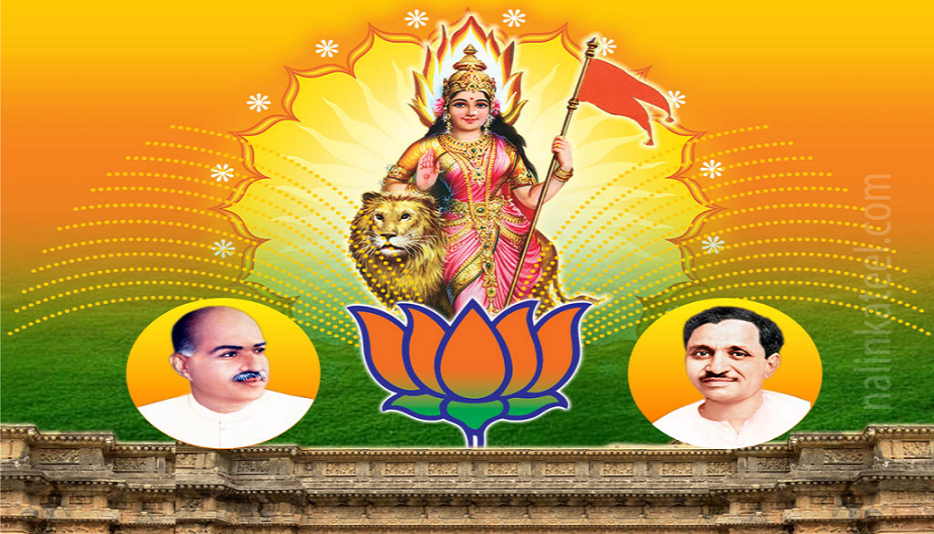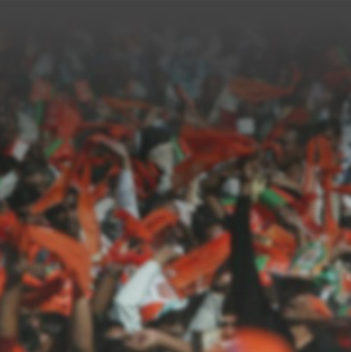Bharatiya Janata Party (BJP)

The Bharatiya Janata Party is one of two major political parties in India, It has been the ruling political party of the Republic of India since 2014.As of 2019, it is the country's largest political party in terms of representation in the national parliament and state assemblies and is the world's largest party in terms of primary membership. BJP is a right-wing party, and its policy has historically reflected Hindu nationalist positions. It has close ideological and organisational links to the much older Rashtriya Swayamsevak Sangh (RSS). The BJP's origin lies in the Bharatiya Jana Sangh, formed in 1951 by Syama Prasad Mukherjee. After the State of Emergency in 1977, the Jana Sangh merged with several other parties to form the Janata Party; it defeated the incumbent Congress party in the 1977 general election. After three years in power, the Janata party dissolved in 1980 with the members of the erstwhile Jana Sangh reconvening to form the BJP. Although initially unsuccessful, winning only two seats in the 1984 general election, it grew in strength on the back of the Ram Janmabhoomi movement. Following victories in several state elections and better performances in national elections, the BJP became the largest party in the parliament in 1996; however, it lacked a majority in the lower house of Parliament, and its government lasted only 13 days.
After the 1998 general election, the BJP-led coalition known as the National Democratic Alliance (NDA) under Prime Minister Atal Bihari Vajpayee formed a government that lasted for a year. Following fresh elections, the NDA government, again headed by Vajpayee, lasted for a full term in office; this was the first non-Congress government to do so. In the 2004 general election, the NDA suffered an unexpected defeat, and for the next ten years the BJP was the principal opposition party. Long time Gujarat Chief Minister Narendra Modi led it to a landslide victory in the 2014 general election. Since that election, Modi has led the NDA government as Prime Minister and as of February 2019, the alliance governs 18 states.
The official ideology of the BJP is integral humanism, first formulated by Deendayal Upadhyaya in 1965. The party expresses a commitment to Hindutva, and its policy has historically reflected Hindu nationalist positions. The BJP advocates social conservatism and a foreign policy centered on nationalist principles. Its key issues have included the abrogation of the special status to Jammu and Kashmir, the building of a Ram Temple in Ayodhya and the implementation of a uniform civil code. However, the 1998–2004 NDA government did not pursue any of these controversial issues. It instead focused on a largely liberal economic policy prioritizing, globalisation and economic growth over social welfare.
The vote share of the BJP was 31% of all votes cast, a low figure relative to the number of seats it won. This was the first In the 2014 Indian general election, the BJP won 282 seats, leading the NDA to a tally of 336 seats in the 543-seat Lok Sabha. Narendra Modi was sworn in as the 14th Prime Minister of India on 26 May 2014.
Instance since 1984 of a single party achieving an outright majority in the Indian Parliament and the first time that it achieved a majority in the Lok Sabha on its own strength. Support was concentrated in the Hindi-speaking belt in North-central India. The magnitude of the victory was not predicted by most opinion and exit polls.
Political analysts have suggested several reasons for this victory, including the popularity of Modi, and the loss of support for the Congress due to the corruption scandals in its previous term. The BJP was also able to expand its traditionally upper-caste, upper-class support base and received significant support from middle-class and Dalit people, as well as among Other Backward Classes. Its support among Muslims remained low; only 8% of Muslim voters voted for the BJP. The BJP was also very successful at mobilising its supporters, and raising voter turnout among them.
In 2019, the BJP won the general election with a majority. Soon after coming to power, on 5 August 2019, the Modi administration revoked the special status, or limited autonomy, granted under Article 370 & 35A of the Indian Constitution to Jammu and Kashmir—a region administered by India as a state and this states consists of the larger part of Kashmir which has been the subject of dispute among India, Pakistan, and China since 1947.
Later in 2019, the Modi administration introduced the Citizenship (Amendment) Act, 2019, which was passed by the Parliament of India on 11 December 2019. It amended the Citizenship Act, 1955 by providing a path to Indian citizenship for illegal migrants of Hindu, Sikh, Buddhist, Jain, Parsi, and Christian religious minorities, who had fled persecution from Pakistan, Bangladesh and Afghanistan before December 2014. Muslims from those countries were not given such eligibility. The act was the first time religion had been overtly used as a criterion for citizenship under Indian law. After the landmark judgment of the Supreme Court, the path to build the temple of Lord Shri Ram was established and on 5 August 2020, the foundation stone of Shri Ram Temple was concluded by the honorable Prime Minister of India, Shri Narendra Modi, which was accepted by people of India.
BJP Membership

